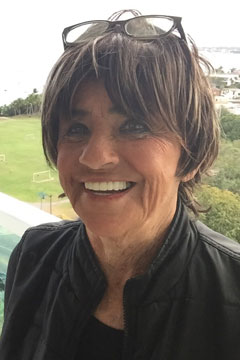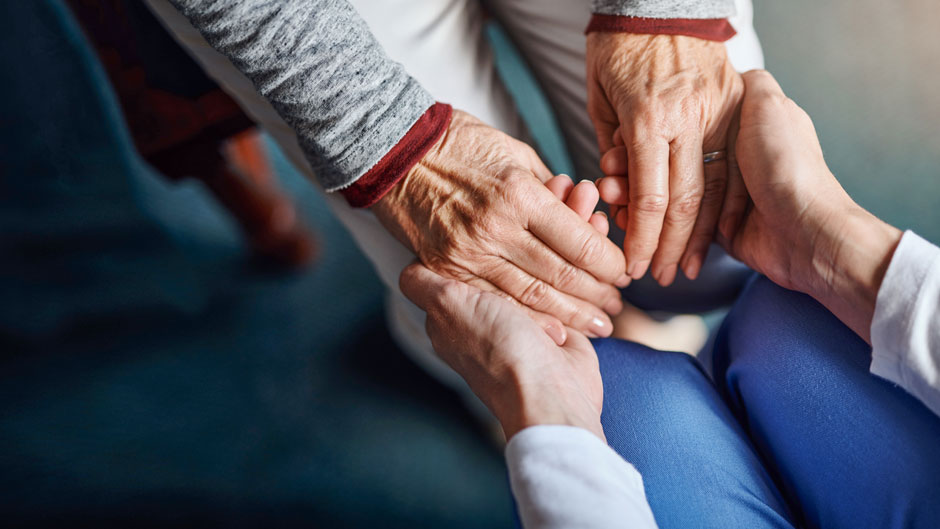Touch. It’s the first of five senses that humans develop in utero and one of our most primal desires.
It also has several benefits that most of us take for granted—until we are forced into social distancing and isolation.
 Tiffany M. Field, a University of Miami professor of pediatrics, began studying the benefits of touch more than four decades ago—when she saw how massage helped her premature daughter thrive in the neonatal care unit. The experience led Field to design a seminal study, which showed that if done regularly, infant massage can help premature babies gain weight faster and leave the hospital earlier.
Tiffany M. Field, a University of Miami professor of pediatrics, began studying the benefits of touch more than four decades ago—when she saw how massage helped her premature daughter thrive in the neonatal care unit. The experience led Field to design a seminal study, which showed that if done regularly, infant massage can help premature babies gain weight faster and leave the hospital earlier.
Since then, research in this area has flourished and Field’s Touch Research Institute, which she founded in 1992 at the Miller School of Medicine, has studied the benefits of massage, yoga, and tai chi for a range of conditions. Now a developmental psychologist and author who is frequently sought out by news outlets, Field discusses her research and how the COVID-19 pandemic may be affecting people’s sense of touch.
What are the benefits of touch?
The primary one is that it has positive effects on immune function, so that we can be healthy. The second benefit is that it can reduce pain. Third, it enhances sleep and there are lots of things that happen if you have better sleep—you’re less depressed, less anxious, and you have less pain. Most people with chronic pain don’t get enough sleep.
Massage may also contribute to improved cognitive function. For example, children with attention deficit hyperactivity disorder are more attentive following a massage, and adults who are given a brief chair massage perform better on math computations. When the skin is moved and pressure receptors are stimulated, vagal activity is increased, and the heart rate is slowed. This all leads to greater attentiveness, which contributes to those cognitive benefits.
Do we crave touch?
Definitely. We know it because people seek it. Touch is one of the primary ways people connect and relate to each other, especially in intimate relationships. Also, early in life, newborns are comforted by being skin to skin with their parents. This continues with the elderly in nursing homes, who are always happy when people hold their hands or give them a pat on the back.
How do you think touch will be affected by the outbreak of COVID-19, which is forcing many people to self-isolate at home?
I do think that with being isolated, families are going to be touching each other more than they used to, so I am hoping there will be more touch within families, such as hugging, which is good.
I do worry about single people who may face some touch deprivation. However, I have collected some data since the pandemic began of people above the age of 18. It seems that single people who are older may have more of a routine, so they are less depressed and have less sleep problems.
Since social distancing guidelines bar touching, is there a way to overcome the detrimental effects of this loss of touch?
It is a depressing time for a lot of reasons. But it’s better that people stay uplifted, because if you are stressed out, your cortisol levels will go up and your natural killer cells (which are the front line of our immune system) will go down. This can allow you to get sick.
Moving around, getting exercise, and virtually communicating with others will help to reduce your mental stress. For families living together, they have each other, which is wonderful.
A lot of the elderly are reconnecting with people they haven’t heard from in a long time. It’s probably very good for our mental health to be reconnecting with old friends.
What can parents do to ease the anxiety that their children are undoubtedly feeling with their new at-home schedules and lack of socialization with friends?
We know that back rubs will significantly lower kids stress and hyperactivity. So, one thing parents can do is to give back rubs and do a lot of hugging when they have the opportunity. Children can also use Zoom or Skype to talk with each other. Or, parents can teach kids to do yoga.
Parents should also give each other back rubs, because this situation is very stressful for everyone. And in these situations, the massager benefits as much as the recipient. We did a study on grandparents who massaged their infant grandchildren, and we learned that they had reduced stress hormones.
How can people who live alone compensate for this lack of physical interaction?
It’s a serious problem for people who are alone to not get touched. But there are lots of positive effects from moving the skin, which can be attained from simply walking around in your living room, because there are even pressure receptors in the feet. There are many other physical things people can do, such as sit-ups, crunches, and stretching. Exercise can give you the same kind of stimulation as someone hugging you, although the emotional-psychological component of having that intimate exchange with someone is gone.
Any kind of moving your limbs around will help. If people feel awkward about rubbing their limbs, use a ball. This is a form of self-massage. They can also massage their scalp in the shower or brush themselves with a loofah. Even handwashing is a decent form of massage—as long as you are moving the skin and applying moderate pressure to it.
Yoga or tai chi exercises are also great, as well as swimming, biking, or walking outside.
Since learning about the benefits of touch on preemie infants, what other avenues of research have you explored?
We have studied the effect of massage for all kinds of medical conditions and autoimmune problems like asthma, diabetes, chronic fatigue, and fibromyalgia. We have also looked at immune function problems, like HIV and breast cancer, along with depression and anxiety. Over the years, what we have found is that you need to move the skin—whether it’s through massage, yoga, or some form of exercise—to stimulate the pressure receptors, which can slow the heart and brain waves. They, in turn, relax and slow down the entire nervous system. If you can do that, you reduce cortisol (the stress response hormone) and save the natural killer cells, which build our immune system and knock down bacterial, viral, and cancer cells. That was an exciting finding for us, because we didn’t know the immune system was being positively affected by massage.
We have also learned that massage increases serotonin, so it can help people with depression. Serotonin is also an anti-pain neurotransmitter. If you can decrease cortisol, you can increase serotonin, which is the body’s natural defense against pain.
When we have done these studies with children, we train the parent in massage therapy, so the child can get a daily dose of massage. With adult studies, we do massages at the institute, and then teach people how to self-massage. For example, we did a carpal tunnel study, as well as one about migraine headaches, where participants learned to massage the neck tendon at the nape of their necks. With migraines, we were able to reduce the headaches by 58 percent.
Yoga has similar effects to massage. We have learned that yoga for prenatal depression was very effective in reducing depression of mothers, as well as reducing the rate of prematurity and low birth weight.
There are also studies we’ve done on straight touch, where we compared preschoolers and teens at a McDonald’s in Paris and Miami. We found that preschoolers and teens in Paris engage in much more physical affection than kids and teens in Miami, but Parisians are also less physically aggressive. This reflected some studies done with monkeys, which showed a very strong link between aggression and a lack of touch.
Recently we have been observing people at airport gates to see if they are touching. But about 98 percent of the time, they are looking at their phones. After COVID-19, people might be more touchy-feely.
What do you think the ramifications will be of this self-imposed ‘‘touch deprivation’’ once many of us return to work and school?
For the people who have been following social distancing measures and wearing masks, they will probably continue in fear of the next wave of disease. The people who haven’t been keeping social distance will probably stay the way they are. Those people will be touching in the same ways they always did, whereas others may go back to just elbow bumping. And that’s OK, because it looks like people are having more fun doing it. They are smiling and laughing like it’s a big joke, whereas shaking hands and hugging seem a lot more serious.
I also have a feeling that families and couples will continue to be more physically affectionate. And, the people who are alone through this may have discovered that they don’t like being alone.
One major benefit from this pandemic is that everyone is exercising more. This period of quarantine has stimulated a great deal of exercise and people are walking, running, and riding bikes.

